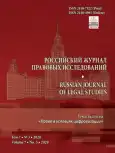Theft as damage and unlawful exemption —doctrinal and enforcement problems
- Authors: Khilyuta V.V.1
-
Affiliations:
- Yanka Kupala State University
- Issue: Vol 7, No 3 (2020)
- Pages: 72-82
- Section: Criminal law
- URL: https://journal-vniispk.ru/2410-7522/article/view/46051
- DOI: https://doi.org/10.17816/RJLS46051
- ID: 46051
Cite item
Abstract
Criminal law institutions and basic concepts are being reformatted. This work focuses on the objective signs of theft and the mode of activity - the seizure of someone else’s property. The existing law enforcement practice and the current recommendations of the Plenum of the Supreme Court of the Russian Federation on the qualification of thefts are critically perceived. The article focuses on provisions of the general theory of criminal law on the classification of theft. This study aims to substantiate the need for correlation of objective signs of theft in relation to the expansion of the boundaries of the object of theft and the method of activity. During the study, traditional methods of the sociolegal and formal-dogmatic analysis were used: documentary, comparative-legal, analytical, systemic, and logical. On the basis of the results of the study, adjustments were made to understand the objective side of theft and expand the boundaries of the method of action. The seizure of other people’s property cannot characterize the mechanism of embezzlement and reflect all aspects of qualification. The prospect of identifying theft with the extraction (receipt) of property benefits carries the risk of erasing the boundaries between embezzlement and other economic crimes. The author proposes models for the development of criminal legislation to establish criminal liability for crimes against property (property crimes). To modify the object of theft, its purpose, and mode of activity, the author proposes to identify a new group of crimes (crimes against the circulation of objects of civil rights) that would cover illegal acts against property and compulsory relations. Further scientific study requires a detailed separation of embezzlement (as attacks on bodily goods), crimes against the circulation of civil rights (as attacks on non-bodily goods), and crimes in economic activity (as attacks on the procedure for performing operations in the economy), summarizing their characteristic features and designing new formulations of crimes in the property sphere.
Full Text
##article.viewOnOriginalSite##About the authors
Vadim V. Khilyuta
Yanka Kupala State University
Author for correspondence.
Email: tajna@tut.by
Candidate of Law, Associate Professor, Department of Criminal Law, Criminal Procedure and Criminology
Belarus, GrodnoReferences
- Boythov A.I. Crimes against property. Saint-Petersburg: Law Center Press, 2002. 775 p. (In Russ.).
- Lopashenko N.A. Encroachment on property. Moscow: Norma: INFRA-M., 2012. 528 p. (In Russ.).
- Khilyuta V.V. Crimes against the circulation of objects of civil rights. Moscow: Yurlitinform, 2017. 352 p. (In Russ.).
- Khilyuta V.V. Theft and appropriation of found property. Moscow: Yurlitinform, 2018. 224 p. (In Russ.).
- Gauhman L.D., Maksimov S.V. Responsibility for crimes against property. Moscow: Jurinfort. 1997. 320 p. (In Russ.).
- Bezverkhov A.G. Property crimes. Samara: Publishing House "Samara University", 2002. 359 p. (In Russ.).
- Adoevskaya O.A. Responsibility for theft under modern Russian law. Moscow: Yurlitinform, 2012. 208 p. (In Russ.).
- Ulanova Yu.Y. General signs of theft as part of theft. Moscow: Yurlitinform, 2013. 304 p. (In Russ.).
- Shulga A.V. Theft in the conditions of the development of modern information technologies and the market for innovative goods. Moscow: Yurlitinform, 2016. 272 p. (In Russ.).
Supplementary files







